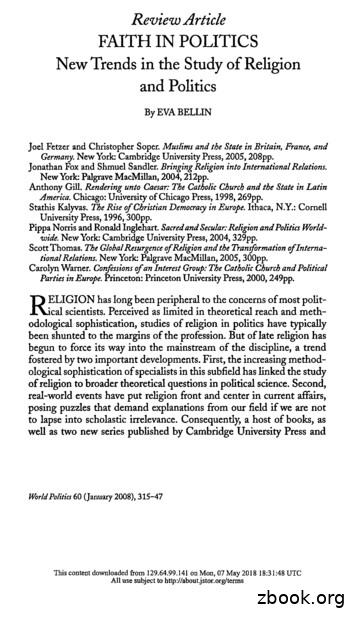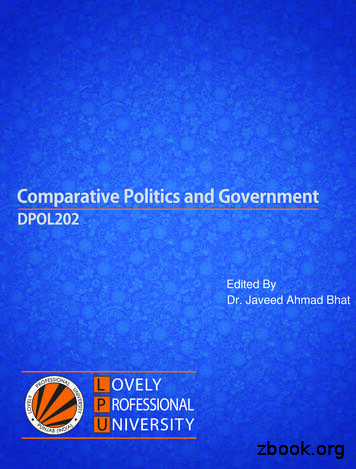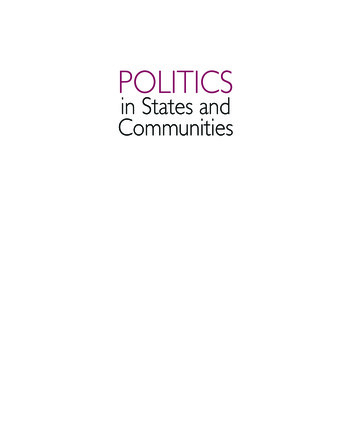AP U.S. Government & Politics Summer Reading 2019 2020 .
AP U.S. Government & Politics – Summer Reading – 2019 – 2020 School YearWelcome to U.S. Government & Politics!We look forward to educating future votersand preparing you for the AP U.S.Government & Politics Exam.“Knowledge will forever govern ignorance;and a people who mean to be their owngovernors must arm themselves with thepower which knowledge gives.”—James MadisonThe AP U.S. Government & Politics course provides a college-level, nonpartisan introduction to keypolitical concepts, ideas, institutions, policies, interactions, roles, and behaviors that characterize theconstitutional system and political culture of the United States. Students will study U.S. foundationaldocuments, Supreme Court decisions, and other texts and visuals to gain an understanding of therelationships and interactions among political institutions, processes, and behavior. They will alsoengage in disciplinary practices that require them to read and interpret data, make comparisons andapplications, and develop evidence-based arguments. In addition, they will complete a political scienceresearch or applied civics project.Summer Reading AssignmentPart I: The 9 Foundational DocumentsThe AP U.S. Government and Politics course features nine required foundational documents to helpstudents understand the philosophies of the founders and their critics.These documents are: The Declaration of ters/declaration transcript.html) The Articles of Confederation htm) Brutus No. 1 nt/brutus-i/) Federalist No. 10 nt/federalist-no-10/) Federalist No. 51 nt/federalist-no-51/) Federalist No. 70 nt/federalist-no-70/) Federalist No. 78 nt/federalist-no-78/) The Constitution of the United States tution) Letter from a Birmingham Jail(http://web.cn.edu/kwheeler/documents/Letter Birmingham Jail.pdf)Assignment: You are to do a close-read of the underlining foundational document for this course – TheConstitution of the United States. You will also need to read to do a close-read of a second document inorder to answer the Free Response Question (FRQ) below. As this is a semester long course, it operatesat a very fast pace. You can expect nightly textbook readings to prepare you for the discussion andactivities the next day in class. If you want to reduce additional workload during the school year, readeach of the nine foundational documents listed above. You can access the documents using the linksabove.Assessment: During the first week of school, you will have a Summer Reading Test, which will focus, inpart, on The Constitution of the United States. You will be required to identify/describe the topics of allof the Articles and the Amendments.
Part II: The 15 Landmark Supreme Court CasesFor the required Supreme Court cases, students should know the major details of each case, the holdingin the majority opinion, the constitutional principle used by the justices to support their finding, and theoverview of the argument(s) by dissenting justices (if applicable). On the AP Exam, students will need toapply this information to a real-world scenario or in comparison to another case.The course framework requires the analysis of 15 cases: Marbury v. Madison (1803) McCulloch v. Maryland (1819) Schenck v. United States (1919) Brown v. Board of Education (1954) Baker v. Carr (1961) Engel v. Vitale (1962) Gideon v. Wainwright (1963) Tinker v. Des Moines Independent Community School District (1969) New York Times Co. v. United States (1971) Wisconsin v. Yoder (1972) Roe v. Wade (1973) Shaw v. Reno (1993) United States v. Lopez (1995) McDonald v. Chicago erit systemcommittee hearingspartisan roleCommittee of the Wholepatronageconcurring opinionpocket vetoconference committeepolitico rolecongressional committeepork (barrel)congressional oversightpower of the purseconstituentsprecedentdelegate rolequorumdischarge petitionreapportionmentdiscretionary spendingred tapedissenting opinionredistrictingdivided governmentriderearmarksrule-making authorityentitlementsRules Committeeexecutive agreementselect committeeexecutive orderssenatorial courtesyexecutive privilegesigning statementsfilibusterSpeaker of the Housefranking privilegespoils systemgerrymanderingstanding committeegovernment corporationsstare decisisgridlockState of the Unionholdstrustee roleimpeachmentunanimous consentinjunctionveto“iron triangles”writ of certiorariissue networksUnit V – Civil Liberties and Civil Rights:affirmative actionBill of Rightscivil libertiescivil rightsCivil Rights Act of 1964Civil Rights movementclear and present danger doctrinecompelling state interestcruel and unusual punishmentde facto segregationde jure segregationdeath penaltydefamationdouble jeopardydue process clauseMiranda rule/warningsNational Organization for Women (NOW)obscenityUSA PATRIOT Act of 2001poll taxprior restraintPro-choice movementPro-life movementpublic safety exceptionracial classificationracial gerrymanderingright to privacysearch warrantsecularselective incorporation
eminent domainequal protection clauseestablishment clauseexclusionary rulefree exercise clausegrand jurygrandfather clausehate speechimpartial juryindictmentJim Crow lawslibelmajority-minority districtingseparate but equal doctrineslanderspeedy and public trialstrict scrutinysymbolic speechtime, place, and manner regulationsTitle IX of the Education Amendments Act of1972unreasonable search and seizureUSA Freedom Act of 2015Voting Rights Act of 1965Women’s Rights movementAssignment: All of the key terms that will be assessed on the Key Terms Quizzes are listed above. Youare to study the terms for Unit I by making flash cards, Quizlets, etc. The key terms from the other Unitsare provided in case you want to get a head start this summer.Assessment: The key terms will not be assessed on the Summer Reading Test. However, you will takea Key Terms Quiz during each Unit of study where you will need to be able to use the term in context.For example, if the term was the Privileges and Immunities Clause, you would be given the following quizquestion: An individual from Ohio cannot be banned from buying land on the coast of Californiabecause of the .Part IV: Preparing for the ExamThe AP U.S. Government and Politics Exam measures students’ understanding of required content.Students must be able to define, compare, explain, and interpret political concepts, policies, processes,perspectives, and behaviors that characterize the U.S. political system. The AP Exam is divided into twocomponents: Multiple Choice Questions and Free-Response Questions.Multiple Choice QuestionsMultiple-Choice Questions Section I of the AP U.S. Government and Politics Exam consists of 55multiple-choice questions, including: Quantitative Analysis: Analysis and application of quantitative-based source material Qualitative Analysis: Analysis and application of text-based (primary and secondary) sources Visual Analysis: Analysis and application of qualitative visual information Concept Application: Explanation of the application of political concepts in context Comparison: Explanation of the similarities and differences of political concepts Knowledge: Identification and definition of political principles, processes, institutions, policies,and behaviorsFree-Response Questions (FRQ)Free-Response Questions Section II of the exam consists of four questions that prompt students to: Concept Application: Respond to a political scenario, explaining how it relates to a politicalprinciple, institution, process, policy, or behavior Quantitative Analysis: Analyze quantitative data, identify a trend or pattern, draw a conclusionfrom the visual representation, and explain how the data relates to a political principle,institution, process, policy, or behavior SCOTUS Comparison: Compare a non-required Supreme Court case with a required SupremeCourt case, explaining how information from the required case is relevant to that in the nonrequired one Argument Essay: Develop an argument in the form of an essay, using evidence from one or morerequired foundational documents
One of the new question types is the Argument Essay. In this essay question, students are given a promptthat can have more than one possible response. They will be asked to write a defensible claim or thesisthat responds to the question and establishes a line of reasoning (the response cannot earn a point forsimply restating the prompt). They must then cite and describe one piece of evidence from a list offoundational documents. To earn additional points students must identify a second piece of specific andrelevant evidence, making sure they explain how or why both pieces support the claim or thesis. Tocomplete their essay students must identify an opposing or alternative perspective, demonstrate a correctunderstanding of it, and refute, concede, or rebut that perspective.Assignment: To help prepare for one part of the AP Exam, you will complete an FRQ – ArgumentEssay. You may use your notes from the readings of the nine foundational documents to complete theessay.Develop an argument that explains which of the three models of representative democracy—participatory, pluralist, or elite—best achieves the founders’ intent for American democracy in terms ofensuring a stable government run by the people.In your essay, you must:Articulate a defensible claim or thesis that responds to the prompt and establishes a line of reasoning Support your claim with at least TWO pieces of accurate and relevant information:o At least ONE piece of evidence must be from one of the following foundational documents: Declaration of Independence Brutus 1 Federalist No. 10 Federalist No. 51 U.S. Constitutiono Use a second piece of evidence from another foundational document from the list Use reasoning to explain why your evidence supports your claim/thesis Respond to an opposing or alternative perspective using refutation, concession, or rebuttalAssessment:A good response should: Articulate a defensible claim or thesis that responds to the question and establishes a line ofreasoning (0–1 point) Describe one piece of evidence that is accurately linked to the topic of the question (1 out of 3points); use one piece of specific and relevant evidence to support the argument (2 out of 3points); use two pieces of specific and relevant evidence to support the argument (3 out of 3points) Explain how or why the evidence supports the claim or thesis (0–1 point) Respond to an opposing or alternate perspective using refutation, concession, or rebuttal that isconsistent with the argument (0–1 point)Questions: If you have any questions, please contact Mr. Berger (berger b@shaker.org) and Ms.Owens (owens k@shaker.org). We look forward to meeting you in August!Due Dates:Summer Reading FRQ – Friday, August 23, 2019 This Free Response Question (FRQ) will be graded based upon completion. You may type the essay or handwrite it in the area provided below.Summer Reading Test – Wednesday, August 28, 2019 This will be a scantron based Test that will include the following:o Articles and Amendment of the U.S. Constitutiono Key Supreme Court Cases See above for details on the types and format of the questionsUnit I Key Terms Quiz – Friday, September 6, 2019
Name:AP Government – Summer Reading – FRQ – Argument EssayDevelop an argument that explains which of the three models of representative democracy—participatory, pluralist, or elite—best achieves the founders’ intent for American democracy in terms ofensuring a stable government run by the people.In your essay, you must:Articulate a defensible claim or thesis that responds to the prompt and establishes a line of reasoning Support your claim with at least TWO pieces of accurate and relevant information:o At least ONE piece of evidence must be from one of the following foundational documents: Declaration of Independence Brutus 1 Federalist No. 10 Federalist No. 51 U.S. Constitutiono Use a second piece of evidence from another foundational document from the list Use reasoning to explain why your evidence supports your claim/thesis Respond to an opposing or alternative perspective using refutation, concession, or rebuttal
AP U.S. Government & Politics – Summer Reading – 2019 – 2020 School Year Welcome to U.S. Government & Politics! We look forward to educating future voters and preparing you for the AP U.S. Government & Politics Exam. “Knowledge will forever govern ignorance; and a people who me
various facets of politics — the Indian Constitution, politics in India, and political theory. Contemporary World Politics enlar ges the scope of politics to the world stage. The new Political Science syllabus has finally given space to world politics. This is a vital development. As India becomes more prominent in international politics and as
WORLD POLITICS . Palgrave Macmillan, have been devoted to the study of religion in com parative and international politics. 1 . The renaissance in this subfield has led to important advances in our understanding of religion in politics, although notable lacunae remain. In . comparative politics, the subfield's turn from purely descriptive work
Local Politics: Institutions and Reform, 4th ed (2014). I have taught graduate seminars on State Politics, American Political Parties, The Politics of Direct Democracy, The Politics of Campaign Finance, and The Politics of Reform, and I also regularly teach a large undergraduate survey course, State and Local Politics.
1.1 Definition, Meaning, Nature and Scope of Comparative Politics 1.2 Development of Comparative Politics 1.3 Comparative Politics and Comparative Government 1.4 Summary 1.5 Key-Words 1.6 Review Questions 1.7 Further Readings Objectives After studying this unit students will be able to: Explain the definition of Comparative Politics.
What is Politics? CHAPTER OVERVIEW This initial chapter introduces and defines politics and applies it to America's government. In Lasswell's famous definition, politics is "the process of who gets what, when, and how." In other words, the text's definition of politics "centers on actions among a number of people
honors humanities history of the us honors history of the us world history honors world history ap world history: modern seminar: ap world history ap u.s. government & politics seminar: ap u.s. government & politics us government honors us government honors social issues ap comparative government & politics
UP CLoSE: Getting into Politics 90 RAnkingS of ThE STATES: Voter turnout Rate: 2012 Presidential Election 93 Continuing Election Controversies 96 Race, Ethnicity, and Political Participation 100 Securing the Right to Vote 102 Minorities in State Politics 105 Women in State Politics 108 Young and Old in State Politics 110
Abstract . The aim of this paper is to build on the Pragmatic Stochastic Reserving Working Party’s first paper (Carrato, et al., 2016) and present an overview of stochastic reserving used with a one-year view of























